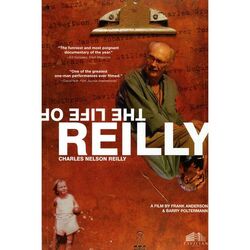| Starring | |
| Charles Nelson Reilly | |
| Movie Release | |
| March 12, 2006/2007 | |
| Packagers | |
| Civilian Pictures L'Orange Films | |
The Life of Reilly was a film adaptation (and edited version) of late actor (and fellow Match Game panelists) Charles Nelson Reilly's one-man play called Save it For the Stage: The Life of Reilly by him and Paul Linke and was directed by Frank L. Anderson and Barry Poltermann Film live before audience at the El Portal Theater in North Hollywood, California in October 2004. The final film was compiled from Reilly's final two performance interspersed with clips, images and music.
This was also CNR's last and final performance before his death on May 27, 2007.
Plot[]
The film begins with Reilly recounting his childhood and his parents in New York City and Connecticut. We meet his family - an institutionalized father, a racist, baseball bat-wielding mother, and a lobotomized aunt, amongst others "Eugene O'Neill would never get near this family" Reilly declares.
Prior to being put into an institution, Reilly's father a Paramount Pictures poster artist and illustrator, was offered the chance to go into business with another illustrator with the intention of making their first animated film in color together. The catch was simply that the senior Mr. Reilly would have to move himself and his family to California. Perhaps a defining moment in young Reilly's life, his father asked his mother her thoughts and she unceremoniously rejected the possibility. The other illustrator went west without the senior Mr. Reilly as a partner. That other illustrator was named Walt Disney.
After this missed opportunity, Reilly's father began drinking heavily and eventually had a nervous breakdown. Upon being institutionalized, the family was forced to move out of the Bronx up to Connecticut to live with Mrs. Reilly's family.
When Reilly turned eighteen, he moved to New York City. "If you wanted to be an actor in those days" he explains, "You did something that's really unheard of today...you studied" young and hungry (literally), Reilly managed to find an acting class at New School. It's rather liberal open doors policy allowed aspiring actors admission even if they didn't have the money to pay.
Reilly's class was taught by a young, award-winning, soon-to-be-legendary actress Uta Hagen. In the class were such future stars and notables as Steve McQueen, Jerry Stiller, Anne Meara, Hal Holbrook, Jason Robards, Geraldine Page and Gene Hackman. It was a group of future Academy, Tony and Emmy Award winners, and as Reilly explains, "We wanted to go on the stage, none of us had any money, and this entire list...couldn't act for s*it".
It was about this time when a friend of Reilly's arranged a meeting with a powerful NBC executive. Reilly went in and was told, "They don't let queers on television" in retrospect, Reilly describes it as "A short meeting". Despite the apparent prejudice against him, his talent and tenacity landed him on Broadway, winning his first Tony Award for his role in How to Succeed in Business Without Really Trying as well as lead roles in the original Broadway casts of Bye Bye Birdie and Hello Dolly!.
Reilly went on to become a fixture in television appearing in numerous episodes Car 54, Where Are You?, The Ghost & Mrs. Muir and starring in Lidsville. He also made hundreds of guest appearance on The Tonight Show with Johnny Carson, second in number of appearance only to Bob Hope and had a more recent memorable guest spot on The X-Files. Over the years, he developed a habit of looking through the week's TV Guide to see how many times he would be on that week. Coming in at over a hundred separate appearance, he reflected on the NBC executive who told him he would not be allowed on television - but now Reilly wondered, "Who do I have to f*ck to get off?!".
Success came to Reilly's professional life, and he has use all the knowledge and expertise he has gained through a lifetime spent acting to teach. His longtime friend Burt Reynolds gave him a theater in which to teach the craft of acting, and it has fulfilled Reilly ever since. As we leave him in what he calls "The twilight of an extraordinary life" we see a portrait of an artist, a victim of prejudice who rose above it, a trailblazing comedic personality, an entertainer, a son, a teacher, and a man laid bare for all to see.

